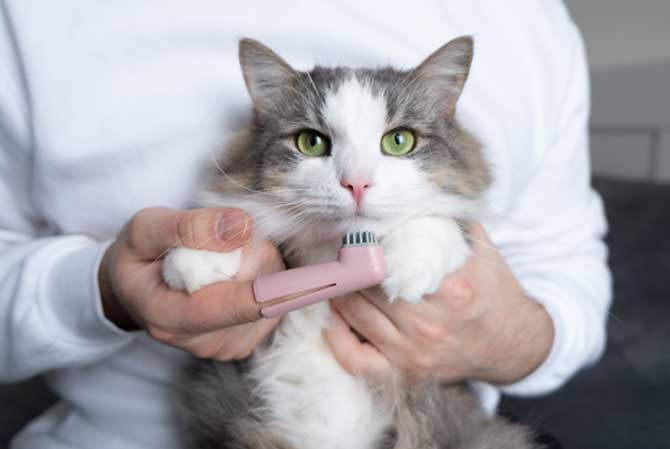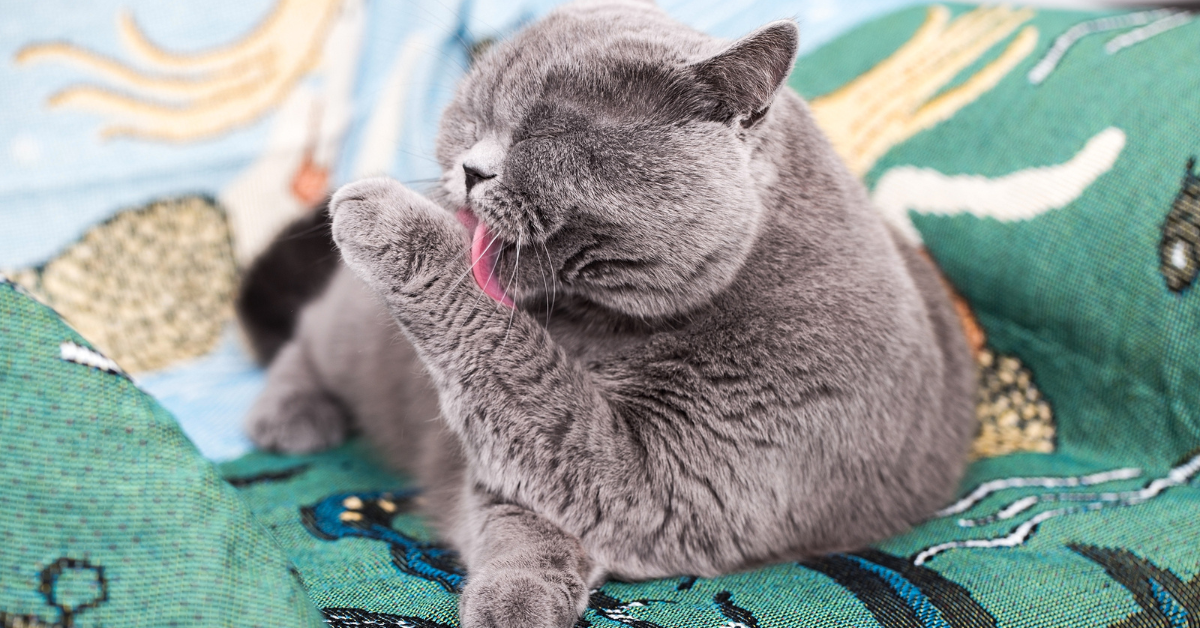How To Brush A Cats Teeth

Dental hygiene is an important part of our day. Most of us humans brush our teeth at least twice a day to keep our teeth and gums clean, to prevent dental disease, and to mask bad breath. While most conversations surrounding healthy teeth and gums revolve around humans and our hygiene practices, pets, including cats, need proper dental care too.
The thought of brushing a cat's teeth can be quite off-putting at first, especially considering most cats tend to be resistant to excessive physical touch, including human-involved grooming or bathing.
Read on for some helpful tips and tricks to brush your cat's teeth. With time, practice, and some tender loving care, you and your cat will hopefully settle into a routine that will make proper dental hygiene a breeze!
Let's get started.
IS IT NECESSARY TO BRUSH MY CAT'S TEETH?
Much like humans, our kitty friends are prone to dental disease. According to the VCA, over half of all cats over the age of three have some sort of periodontal disease, which affects the tissues surrounding a cat's teeth. Just like in humans, periodontal disease in cats is mostly preventable through regular teeth brushing.
Most cases arise from the build up of plaque on your cat's teeth. If not addressed with regular toothbrushing, this plaque thickens into tartar, which if left untreated, can develop into periodontal disease … and a pricey vet bill. Getting your cat into a regular toothbrushing regimen of at least a few times per week can prevent serious disease, saving both your cat's pearly whites and your wallet.
HOW DO I INTRODUCE MY CAT TO TOOTHBRUSHING?
For starters, the best time to introduce your cat to hygiene practices like toothbrushing is when they are a kitten. With youth and extra time on your side, your cat becomes accustomed to practicing good dental hygiene from a young age. If you have an older cat, the process may take longer and may be a little more frustrating, but is still worthwhile.

SUPPLIES:
- Gauze: Before you introduce a toothbrush, you'll use gauze while you get your cat accustomed to having their mouth and teeth messed with.
- Cat toothbrush or finger-fitted toothbrush: Most veterinarians will recommend small, soft-bristled brushes specifically designed for a cat's mouth and teeth. Soft gauze can be a great precursor to a toothbrush.
- Veterinary toothpaste: It is extremely important to use a veterinary toothpaste formulated specifically for cats, as human toothpaste can contain ingredients that are toxic to cats such as fluoride and artificial sweeteners. If available, try to choose a poultry or fish-flavored toothpaste to make it slightly more enticing to your cat.
A STEP-BY-STEP PROCESS
- Ensure that you choose a quiet time and place. Too much stimulation and stressors such as loud noises or kids running around can make an already nerve-racking experience more hectic.
- If your cat is calm, start by giving her plenty of affection and comfort. If she is resisting, acting up, or visibly distressed, it's best to let her cool off and try again later.
- Begin to gently manipulate your cat's mouth with the light touch of your fingers. If she responds well, reward her with gentle praise and some treats. If you have gauze, you can attempt to move on to the soft gauze in place of your fingers. Move the gauze gently along her teeth, front canines, and gums. Be advised that it may take several sessions for your cat to grow accustomed to having her mouth handled and manipulated, and that you may experience some bites and scratches along the way.
- Once your cat has gotten used to having her mouth manipulated with your fingers, gauze, and/or toothbrush, introduce the toothpaste. Start with a small amount first.
- If your cat continues to cooperate, introduce the toothbrush. Allow your cat to familiarize herself with this strange, new object. Start off where the gum meets the tooth and use a circular brushing motion. Begin with your cat's front canines, then move back towards the molars. Repeat on the other side. You only need a few gentle strokes per tooth, with the entire process taking about 2 to 3 minutes.
Ideally, you should brush your cat's teeth daily. However, due to a mix of busy schedules and fickle kitties, we understand that this isn't always an easy feat. Brushing your cat's teeth just a couple times per week can make a huge difference in your cat's dental health.
It's important to remember that it will likely take a while for your cat to adjust to a toothbrushing routine. If your cat is extra finicky, start off brushing periodically, whenever you are able to. Increase the amount of times you brush each week. Be sure to replace the toothbrush at least once every three months, and if you have multiple cats, ensure each one has their own toothbrush.
After some time, if your cat is still finicky or simply won't let you brush their teeth, consider a visit to your vet. Veterinarians may be able to pinpoint dental or gum issues that may not be readily apparent to us. They also have the experience needed in order to brush a cat's teeth.
CONCLUSION
Just like humans, cat's need their teeth brushed too. In order to get your cat accustomed to having their teeth brushed, we recommend you start brushing your cat's teeth while they are a kitten. If you have an older cat, it may take more time, but with patience and some time your cat should warm up to the idea of having his teeth brushed. Be sure to only use products that are safe for cats. If your cat just won't let you touch their mouth or teeth, consider a visit to your vet for some extra help.
Sources:
Previous article

Next article

Related posts
View all-

5 Simple Tips to Make Sure Your Cat Drinks Enough Water
Ensuring your cat stays hydrated is important, but it can be challenging since many cats don't drink enough water. Dehydration can lead to kidney disease and other health issues. Fortunately, you can encourage your cat to drink more with a few simple changes. Read Article -

How to Keep Your Cat Busy at Night (So You Can Sleep)
For many cat owners, the quest for a good night's sleep while keeping their feline friends content and engaged can seem like a never-ending battle. Cats, naturally more active at night or early in the morning, often disrupt your sleep schedules with nocturnal activity, whether through playful nature or seeking attention. Read Article -

Should You Bathe Your Cat? Everything You Need to Know About Cat Hygiene
When it comes to cat hygiene, a common question among cat owners is, "Should you bathe your cat?" Understanding how to care for felines, especially bathing cats properly, is crucial for maintaining their overall health. Most cats are fastidious groomers, but specific scenarios like long-haired cats getting dirty or skin irritations, might require a bath.
Read Article



